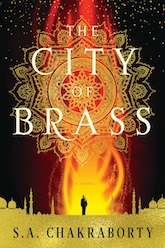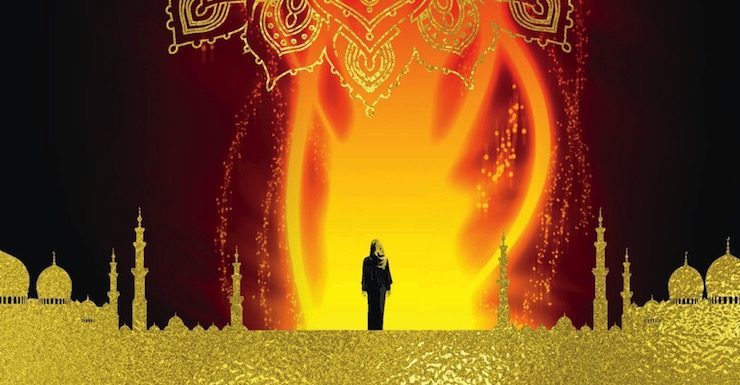A young hustler on the streets of 18th Century Cairo, Nahri lives by her wits and has always done so alone, using certain special abilities that help her get by. She can, most of the time, tell if someone is sick, or what ails them. She has “yet to come upon a language she didn’t immediately understand,” can sometimes help those who are unwell, and seems to be able to heal quickly herself. Nahri uses her strange abilities to take what she can from whom she can, trying to build up a little store of cash so she may one day train to be a real healer.
But one ordinary day, what should be a run of the mill fake exorcism ends up going horribly wrong when the young girl Nahri is pretending to help turns out to be actually possessed by a djinn—an ifrit who recognises something special in Nahri.
In attempting her daily hustle, Nahri manages to spike the interest of the evil ifrit, and also calls forth another ancient djinn, the great Afshin warrior Dara, protector to some, scourge to others. Dara is entirely uncertain how Nahri has managed to call him, but immediately sees that she is no ordinary girl—half djinn, perhaps, but not an average djinn-human either. In an attempt to keep Nahri safe from the ifrit who are hunting her in Cairo, Dara insists she come with him to the great djinn city of Daevabad, where she may be safe though he himself may not be welcomed.
Buy the Book


The City of Brass: A Novel (The Daevabad Trilogy)
Upon reaching the city, Nahri finds out that she is the last in the line of Nahids, the great healers of the djinn races and previous rulers of the City of Brass. She is suddenly propelled into complicated djinn politics, having to learn to manipulate the court and the king, as he attempts to manipulate her and her potential powers. As an outsider, no matter what her lineage may be, Nahri remains the reader’s point of view into this alternate parallel world. From her perspective we see the complicated djinn universe, its otherness and its injustices and glories. She is quick to point out the ways in which Daevabad is lacking, the ways in which it could be better, and to appreciate all its amazements, but she is still to learn of the long and turbulent history of the djinn tribes.
Daevabad and its surroundings are home to a variety of djinn races, which can get a bit confusing if you don’t firmly place in your head who is from what family and/or race. The worldbuilding is decent and the narrative is plotted deftly enough for it to be just very readable regardless of whether a reader is completely certain which clan someone’s mother was from, or what their historical allegiances were. The names given to various sorts of djinn are used freely (there’s a glossary in the back for those who want to double-check), and it can be hard to recall relationships between the various tribes, though not enough to hamper the sheer enjoyable readability of the writing.
Ottoman court politics are an inspiration for a narrative deeply rooted in Islamic mythology in the Middle East. The story of Sulaiman’s seal, and the power it had over djinns is central to The City of Brass. The forced slavery of djinns and all that came with enslaving an entire race to carry out the abhorrent crimes of their masters are inherent to who Dara is, and so casts a shadow over his relationship with Nahri and indeed, over his presence in Daevabad itself. In turn, Nahri, as the sole heir apparent of a powerful race of djinn healers, must contend with having to acquiesce to a king who is the descendant of those who took control of the city from her ancestors.
Chakarborty doesn’t shy away from the usual sorts of djinn cliches—there is plenty of conjuring of fire, a flying carpet, legendary flaming double bladed swords, fierce creatures belonging to every element, harems of beautiful female djinns dancing as they make flowers bloom in air, and even objects that hold the souls of djinn (think rings, if not lamps). But there’s also the strange, tense slave-master dynamic very much present in Daevabad, even though Sulaiman has been long gone. Genocide, racial discrimination, religious extremism, violence against the half-djinn, half-humans is all rife in Daevabad, and has been for centuries in some form or the other. Not so different from the human world, after all.
The story is told from Nahri’s perspective and from prince Alizayd’s: one the apparent descendant of a race that no longer exists yet was vital at one point to djinns, the other the second son of the current king, the prince who will never inherit the throne but wants desperately to make amends to those he thinks his people have wronged, without being disloyal to his family. Ancient tribal conflicts simmer just below the surface in Daevabad, with Alizayd’s father, the current king, attempting to manage a balance of sorts between the races as rebellions and insurgencies are brewing. Alizayd, however, appears to be fuelling some of the insurgents in their more violent attempts to improve their lives, though of course he does not know to what extent he is helping them at first. Nahri’s entry into his world throws him for a loop, when he is placed by his father to keep an eye on her.
Named for one of the stories in the Arabian Nights, The City of Brass is a well paced, entertaining and solidly researched (but never boring) historical fantasy that shifts the centre away from western folklore, with a strong denouement and a craftily set up epilogue that should segue well into the next installment of the trilogy. To most (western?) readers whose only experience of the djinn is Disney, The City of Brass is going to be a lush, entertaining fable inspired by Middle Eastern and Islamic folklore that has just enough familiar elements to not be considering worrying alien, and yet is exotic enough to thrill and entice and tick off diversity boxes in the right way. Within the dynamics of the various djinn tribes, though, are nestled valid socioeconomic politics for those who wish to read a little further past the surface of the narrative. To those readers familiar with the stories of Sulaiman and the djinn, with the Middle East and indeed with just that little bit of world history, it will be these politics that are intriguing, more so than the idea of creatures of fire living alongside us or the powers they possess and the adventures they have. This is actually a really clever approach—it’s not “other” enough to frighten more conservative readers (or publishers), and yet different enough to widen the scope of current popular fantasy.
The City of Brass is available from Harper Voyager.
Read an excerpt from the novel here.
Mahvesh loves dystopian fiction & appropriately lives in Karachi, Pakistan. She writes about stories & interviews writers the Tor.com podcast Midnight in Karachi when not wasting much too much time on Twitter.










